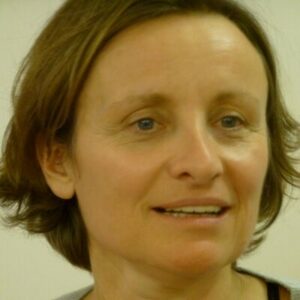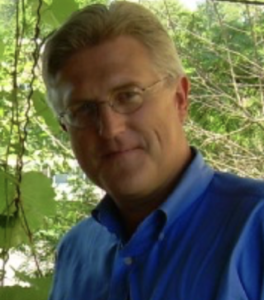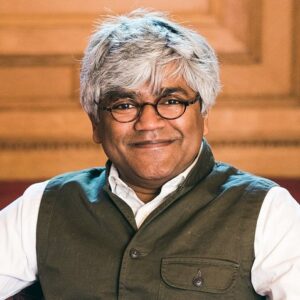Chair: Sophie Delaunay
(Humanitarian Health, Global Health Leadership)
 Sophie Delaunay is a senior executive with over 25 years of experience responding to international medical emergencies at field and HQ levels across the private and public sectors. She has broad experience in designing health strategies and conducting needs assessments, programme evaluations and interventions in politically-charged environments (epidemics, conflicts, authoritarian regimes, population displacements, natural disasters). In-depth knowledge of the international aid and global health systems and of the African and Asian environments. Sophie Delaunay first became involved with MSF in 1993 in administrative and finance roles, then worked extensively in program management both in the field and at headquarters. Delaunay has worked on MSF projects in Thailand, Rwanda, China, and Korea, as well as in the French and U.S. offices. Delaunay worked for three years as Program Director in ESTHER, a French government AIDS agency, where she supervised the organization’s programs in 18 countries
Sophie Delaunay is a senior executive with over 25 years of experience responding to international medical emergencies at field and HQ levels across the private and public sectors. She has broad experience in designing health strategies and conducting needs assessments, programme evaluations and interventions in politically-charged environments (epidemics, conflicts, authoritarian regimes, population displacements, natural disasters). In-depth knowledge of the international aid and global health systems and of the African and Asian environments. Sophie Delaunay first became involved with MSF in 1993 in administrative and finance roles, then worked extensively in program management both in the field and at headquarters. Delaunay has worked on MSF projects in Thailand, Rwanda, China, and Korea, as well as in the French and U.S. offices. Delaunay worked for three years as Program Director in ESTHER, a French government AIDS agency, where she supervised the organization’s programs in 18 countries
Courtland Robinson PhD
(Humanitarian Health, International Health, Johns Hopkins University)
 Courtland Robinson received his PhD in Demography from the Johns Hopkins Bloomberg School of Public Health in 2004 and is now an Associate Professor in the Department of International Health (with a joint appointment in the Department of Population, Family and Reproductive Health) and also Deputy Director of the Center for Refugee and Disaster Response. He has worked in the field of refugee and disaster programs and policy since 1979, with positions in the United States (Indochina Refugee Action Center and the US Committee for Refugees) and internationally (Save the Children, World Education, Mercy Corps and the Asian Research Center for Migration). His research interests have focused on populations in migration, whether displaced by conflict or natural disaster, or in the context of migrant labor and human trafficking. Recent projects include: evaluation of the impact of humanitarian aid on durable solutions for populations displaced by the tsunami in Indonesia; measuring impact of migration and displacement on physical and mental health of older adults in the Republic of Georgia; a study of drought and famine on mortality and displacement in Somalia; and a three-country study of sexual and reproductive needs and services for very young adolescent (10-14 year old) refugees (Somalis in Ethiopia, Burmese in Thailand, and Syrians in Lebanon).
Courtland Robinson received his PhD in Demography from the Johns Hopkins Bloomberg School of Public Health in 2004 and is now an Associate Professor in the Department of International Health (with a joint appointment in the Department of Population, Family and Reproductive Health) and also Deputy Director of the Center for Refugee and Disaster Response. He has worked in the field of refugee and disaster programs and policy since 1979, with positions in the United States (Indochina Refugee Action Center and the US Committee for Refugees) and internationally (Save the Children, World Education, Mercy Corps and the Asian Research Center for Migration). His research interests have focused on populations in migration, whether displaced by conflict or natural disaster, or in the context of migrant labor and human trafficking. Recent projects include: evaluation of the impact of humanitarian aid on durable solutions for populations displaced by the tsunami in Indonesia; measuring impact of migration and displacement on physical and mental health of older adults in the Republic of Georgia; a study of drought and famine on mortality and displacement in Somalia; and a three-country study of sexual and reproductive needs and services for very young adolescent (10-14 year old) refugees (Somalis in Ethiopia, Burmese in Thailand, and Syrians in Lebanon).
Unni Karunakara, MD PhD
(Humanitarian Health, Global Health Leadership, Yale Law School)
 Dr. Unni Karunakara was International President of Médecins Sans Frontières / Doctors Without Borders (MSF) from 2010-2013. He has been a humanitarian worker and a public health professional for more than two decades, with extensive experience in the delivery of health care to populations affected by conflict, disasters, epidemics, and neglect in Africa, Asia, and the Americas. He was Medical Director of the MSF’s Campaign for Access to Essential Medicines (2005-2007) and co-founded VIVO, an organisation that works toward overcoming and preventing traumatic stress and its consequences. Karunakara serves on the Board of Directors of Drugs for Neglected Diseases Initiative (DNDi) India and MSF Holland. Dr Karunakara is currently senior fellow of Yale Law School, and was a Senior Fellow of the Jackson Institute for Global Affairs at Yale University from 2014-2017. He has held various academic and research fellowships at universities in South Africa, Zimbabwe, Uganda, Germany and the United Kingdom, focusing on the demography of forced migration and the delivery of health care to neglected populations affected by conflict, disasters and epidemics. Karunakara served as the Deputy Director of Health of the Earth Institute, Millennium Villages Project (2008-2010), and was Assistant Clinical Professor at the Mailman School of Public Health (2008-2017), both at Columbia University. Karunakara is a Visiting Professor at Manipal University
Dr. Unni Karunakara was International President of Médecins Sans Frontières / Doctors Without Borders (MSF) from 2010-2013. He has been a humanitarian worker and a public health professional for more than two decades, with extensive experience in the delivery of health care to populations affected by conflict, disasters, epidemics, and neglect in Africa, Asia, and the Americas. He was Medical Director of the MSF’s Campaign for Access to Essential Medicines (2005-2007) and co-founded VIVO, an organisation that works toward overcoming and preventing traumatic stress and its consequences. Karunakara serves on the Board of Directors of Drugs for Neglected Diseases Initiative (DNDi) India and MSF Holland. Dr Karunakara is currently senior fellow of Yale Law School, and was a Senior Fellow of the Jackson Institute for Global Affairs at Yale University from 2014-2017. He has held various academic and research fellowships at universities in South Africa, Zimbabwe, Uganda, Germany and the United Kingdom, focusing on the demography of forced migration and the delivery of health care to neglected populations affected by conflict, disasters and epidemics. Karunakara served as the Deputy Director of Health of the Earth Institute, Millennium Villages Project (2008-2010), and was Assistant Clinical Professor at the Mailman School of Public Health (2008-2017), both at Columbia University. Karunakara is a Visiting Professor at Manipal University
Marine Buissonniere
(Humanitarian Health, Global Health Leadership)

Marine Buissonnière is an independent advisor and practitioner in the fields of global health, health-related rights, and humanitarian action. From 2003 to 2007, Buissonnière served as secretary-general of MSF International (Médecins Sans Frontières/Doctors Without Borders). She worked with MSF in the field between 1995 and 2003 (including in China, the occupied Palestinian territories, Japan). Until 2015, Buissonnière was director of the Open Society Public Health Program, where she worked to improve access to health care for marginalized members of society, including people who use drugs, sex workers, transgender people, people with mental disabilities, the Roma, and those in need of palliative care. Some of her other engagements have included Lifebox Foundation (review of the surgical checklist at 10 years); MSF (review of critical incidents; context analyses; research on attacks against health care); Open Society Foundations (access to medicines and mental health strategies); American Jewish World Service (humanitarian program evaluations); Essex University (research on the criminalization of health care); and Vox Media.
She currently works as senior advisor to the Prevent Epidemics team at Resolve to Save Lives, where she partners with governments around the world to implement evidence-based strategies to find, stop, and prevent disease threats, with a particular focus in the past 18 months on COVID-19. She also co-chairs MSF’ Transformational Investment Capacity, which aims to transform MSF’s ability to address the most pressing medical and humanitarian challenges around the world.
Buissonnière holds a master’s degree in public policy and a health and health policy graduate certificate from Princeton University’s School of Public and International Affairs. She serves on the Advisory Council of Last Mile Health; on the Board of Directors of Grand Challenge Canada; and on the advisory board of the Global Health Center of the Geneva-based Graduate Institute of International and Development Studies.
